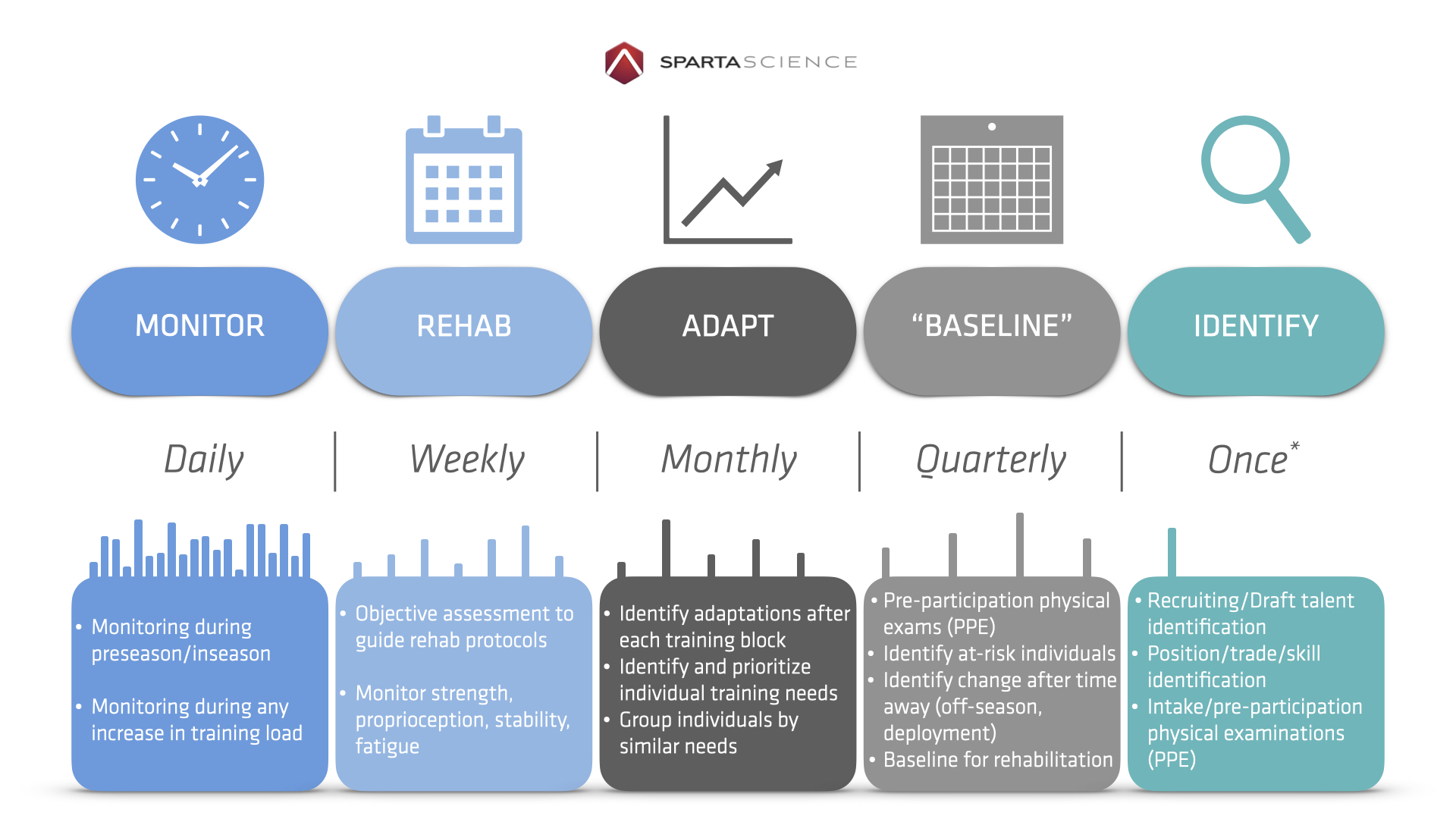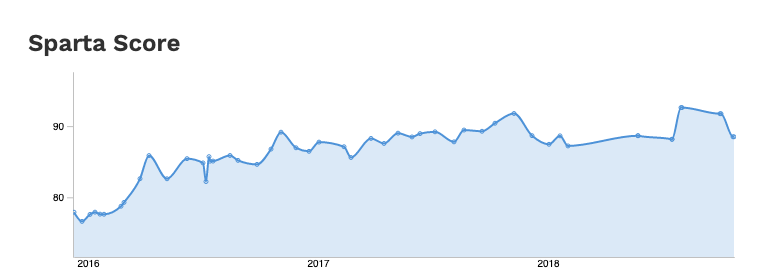This article provides general guidance for assessment frequency based on different use cases.

The Short Answer:
The simplest answer to these types of questions is it depends, but more specifically, it depends on the goal. Generally speaking, you should assess consistently and as often as is practical and useful. When discussing the frequency of assessment it is critical to understand three things:
-
The context and the goal of assessment and data collection
-
What necessary reporting and action will result from the assessments
-
What is actually practical in your environment and workflows
For organizations hoping to utilize the Sparta Scan Kit for fatigue monitoring, more frequent assessment is recommended (daily/weekly). For larger organizations that are utilizing the Sparta Scan Kit to identify potential risk factors and design training plans, less frequent assessment is required (biweekly/monthly). In either case, consistent assessment is critical to identify longitudinal trends and it provides opportunities for consistent education as well.
The Long Answer:
With every new partnership, one of the most common questions we get is “How often should we assess?” Our answer to this is always the same: “As often as you’re willing to do something about it.” This may seem like a bit of a cop-out, but simply speaking we need to understand if you aren't willing to change anything based on the data, what is the value in assessing? As we go more into depth, the answer to this question actually depends on a few different things. There is a series of follow up questions we can utilize to help guide what the optimal frequency of assessment is, and likely to no surprise the answer will be unique to your situation.
There are three main factors to take into consideration when understanding assessment frequency.
-
What is the goal or context?
Different types of data should have different goals associated with their collection. It is important to understand that each of the different assessments can tell us different information. Acute interventions such as adjustments to daily training and recovery protocols are going to require more frequent data collection. If you are interested in identifying fatigue or recovery, more frequent assessment is required because an individual's recovery status can change dramatically in a short period of time.
Organizations that are interested in utilizing the Sparta system to identify and manage fatigue will need to assess more frequently than those with other goals. In sport, some of our basketball partners will do this, performing the assessments multiple times per week, even sometimes on a daily basis during the competitive season. If the goal is more generally to identify an individual's needs and injury risk, the assessments can be further apart. For sporting organizations, this is more typical during the offseason. We know for chronic adaptation to occur, oftentimes real structural changes need to happen to improve both neurological and physiological functions. This takes time. A good rule of thumb is to assess every 3-4 weeks, or within at least 30 days of the previous assessments. Consistent assessment is necessary to allow for enough data to become meaningful, so once or twice a year doesn't cut it.

The more we can standardize when and how the assessments are performed the easier it is to compare the data historically. However, we are able to control for some of this by understanding the context of when the assessment is done. This is absolutely important when interpreting the information, and needs to be a consideration for all organizations. For example, if we assess a soldier initially after a long weekend of rest and recovery then reassess her three weeks later immediately after a 20-mile ruck, we need to understand the contexts are different. That doesn't mean the data is any less reliable or valid, we just need to understand it is a valid measure of that individual at that given point in time. Ideally, when utilizing the assessments to identify more chronic changes or adaptations, individuals are in a more rested state similar to their previous assessment.
-
What are you going to do or change?
This is a critical component to understand, as collecting data simply for the sake of collecting data can not only be a waste of time but a detriment to trust and culture for an organization. Individuals will very quickly begin to feel like research study subjects if data is collected and never again shared, discussed, or utilized. Even in high functioning organizations, this can quickly erode trust. From a data hygiene perspective, this can also be a huge problem as without a simple understanding of why data is being collected the reliability of the data can be negatively impacted. This can be because of a lack of effort, lack of honesty, or even pure sabotage. For a simple example, it is easy to sabotage a clinically reliable and valid fasting blood glucose test and make it unreliable, simply don't fast.
If you are going to collect data, you need to be prepared to listen to what the data is telling you. If you are utilizing the Sparta system to identify an individual's needs from the Jump Scan, you need to be willing to change their training plan based on the data. Otherwise, what's the point? One important factor to point out, is that this doesn't mean that we always have to make changes after data collection. Sometimes when assessing we will see improvements or positive changes that we are after, so sticking to the current plan may be the best option! The assessments utilized in the Sparta system should guide some sort of decision-making process, and educating and engaging the end-users can only improve outcomes. While they may not like what the data is telling them if they see how it is being utilized it becomes much easier to create trust and make change.
-
How often is actually practical in your environment?
This third point is probably the most important question to ask as it tends to trump the others. What is actually doable for you and your team? If you have an organization of 1,000 individuals that need to assess and 2 systems, it simply isn't going to be practical to assess all 1,000 of them every single day. It is important to understand what limitations actually exist in the real world, but also how we can bend the rules to allow us to assess more frequently when needed. For example, individuals who are at high risk or have greater exposure can be prioritized and assessed more frequently, while individuals at lower risk can be assessed less frequently. The practicality of the Sparta system allows for an extremely short assessment time, so the larger question of practicality becomes the number of individuals that need to assess in a given time. In many cases, our partners will teach individuals how to run the system and they will test themselves!
Conclusion:
Generally speaking the more often we can collect data and the more consistently it is collected the more powerful that data can become. So to summarize, you should assess consistently and as often as is practical and useful.
